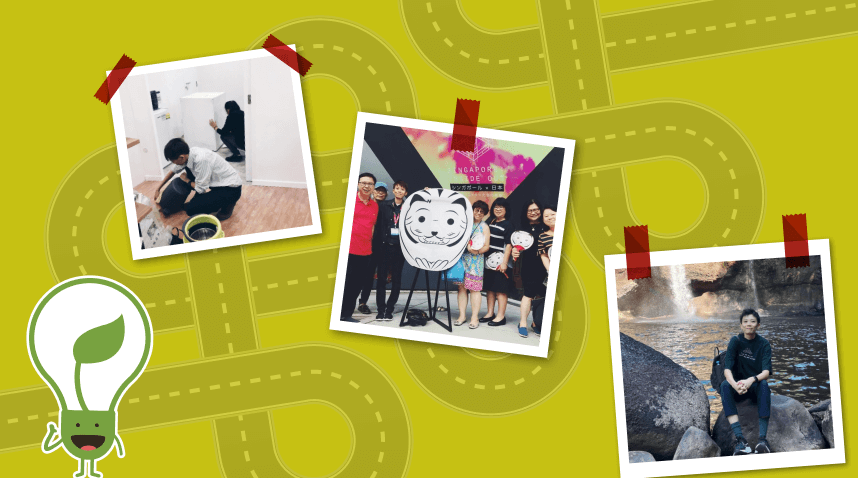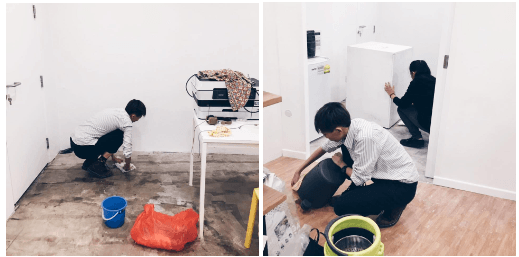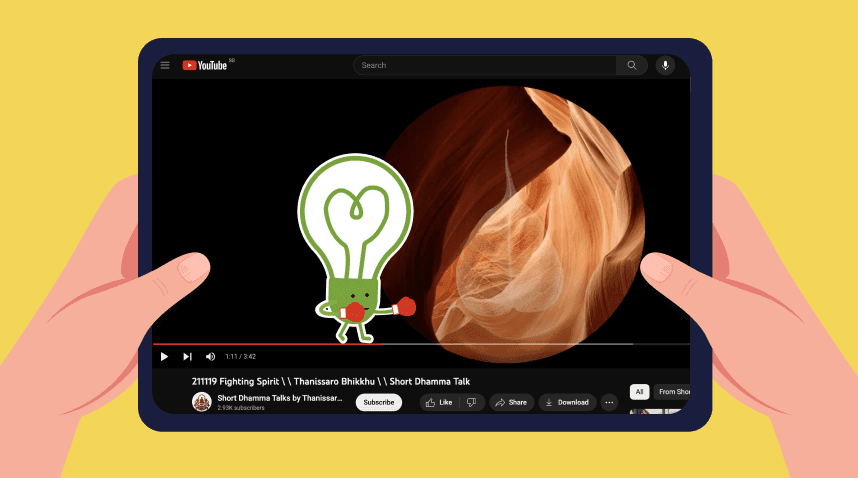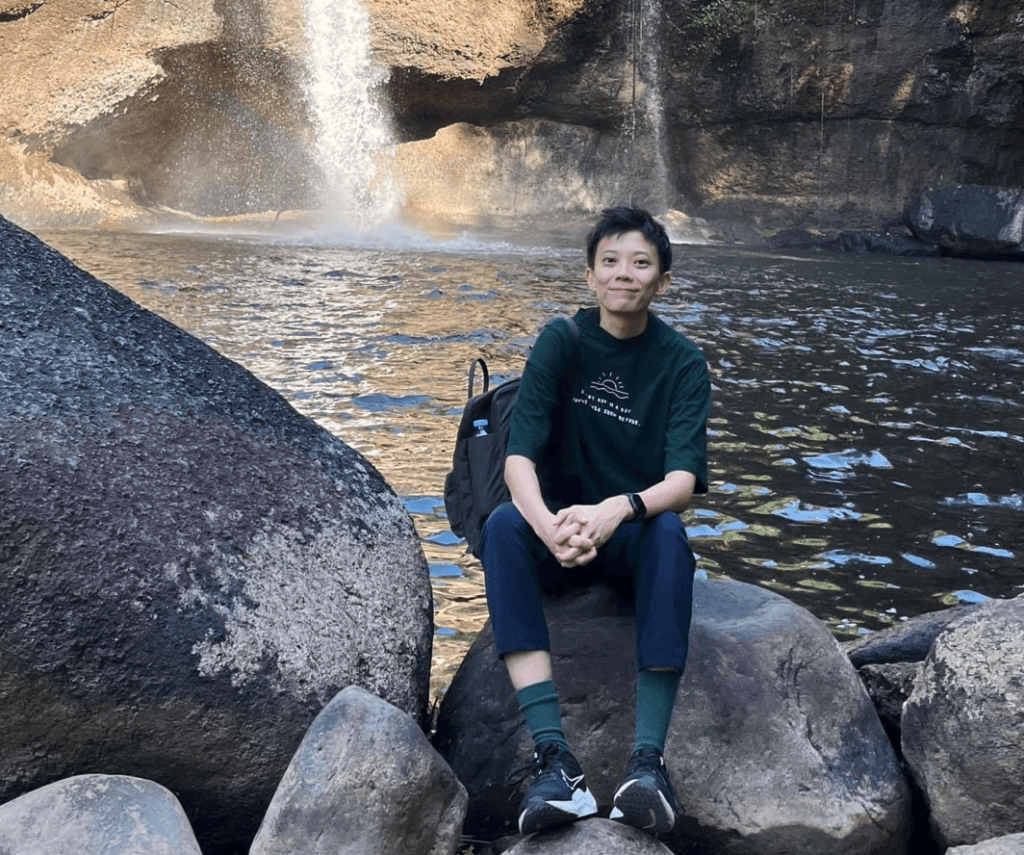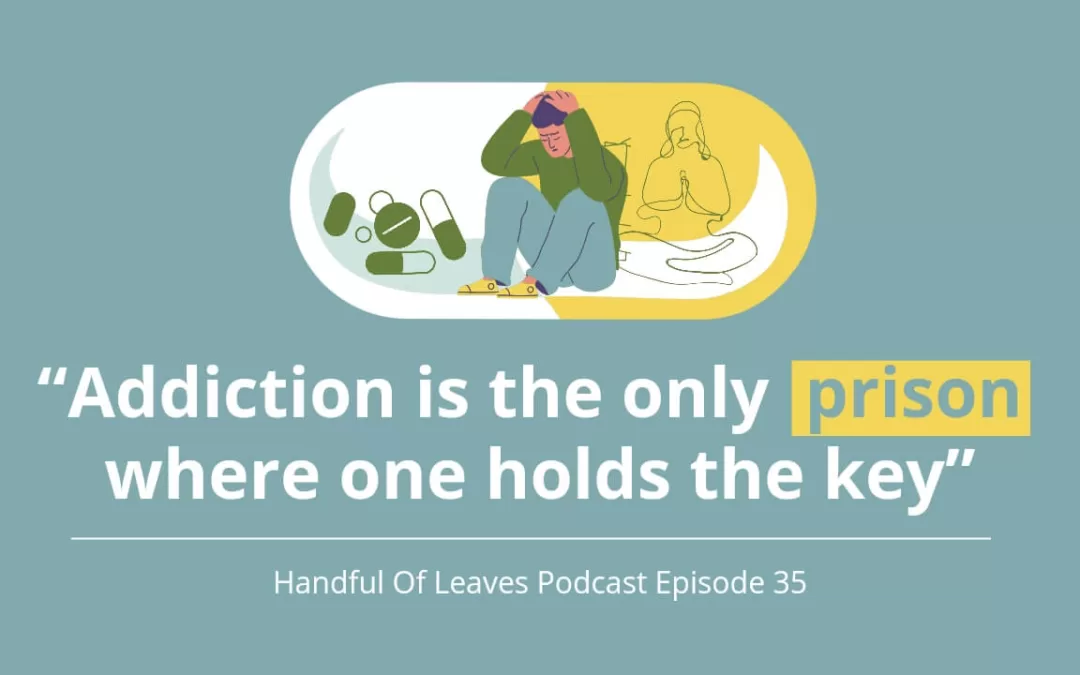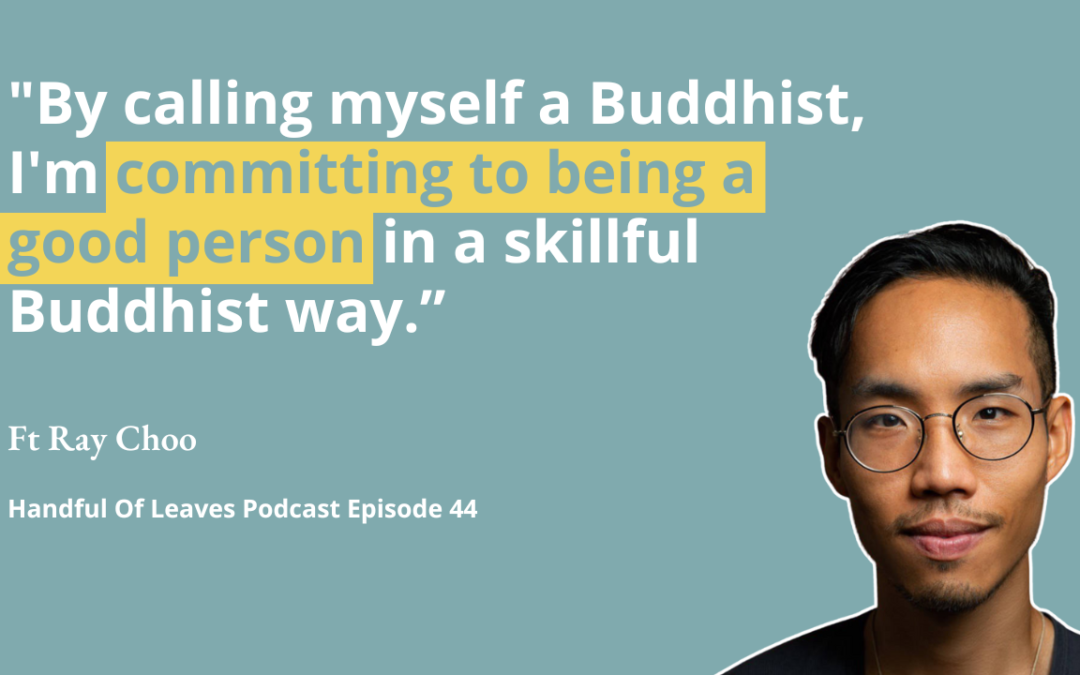
Buddhism vs. Spirituality: When to Call Yourself A Buddhist? ft. Ray Choo (Director and Producer of Waking Up 2050)
Summary:
In our newest episode, we delve into the intricate journey of spiritual identity with our special guest, Ray Choo, director and producer of Waking Up 2050 🎬. From his personal experiences to the broader concepts of Buddhism, Ray sheds light on embracing the Buddhist identity as a commitment to the path of wisdom and compassion, and unravel the evolving perceptions of religion and spirituality in today’s world.
About the Speakers
👤 Ray Choo Hongrui was born and raised in Singapore. He studied Communications Design in Berlin, Germany, at HTW Berlin-University of Applied Sciences where he had the opportunity to try his hand at filmmaking and storytelling and experience a world where Buddhism, its meanings and functions are not established. The conversation in the West is just gaining momentum and presence. In trying to contribute to this dialogue, Ray redefined for himself what it means, to walk the path of Dharma. Through WAKING UP 2050, he met his teacher Lopen Pema Deki with whom he took his precepts and continues to study the Dharma. Ray currently works and resides in Berlin as a motion designer.
Key Takeaways:
The Journey of Embracing the Buddhist Identity
Ray’s narrative unveils the intricate journey of self-identification as a Buddhist. Despite being born into a Buddhist family, he embarked on a profound exploration of his spiritual identity. Through pivotal life events, including his father’s stroke and the sudden loss of a friend, Ray found himself grappling with the essence of Buddhism and its relevance in his life. His decision to formally take refuge in Buddhism was not merely a label but a commitment to a path of wisdom and compassion.
The Practicality of Buddhist Practice
The conversation emphasizes the practicality of Buddhist teachings in navigating life’s challenges. Ray vividly recounts instances where his newfound Buddhist perspective provided solace and guidance to those around him. From offering comfort to grieving friends to sharing insights on the grieving process, Ray illustrates how Buddhist principles transcend mere rituals, offering tangible support and wisdom in times of need. Buddhism, as Ray articulates, is not confined to temples or scriptures but is deeply embedded in the fabric of everyday life, offering practical tools for navigating its complexities.
Embracing the Journey with Openness
A recurring theme throughout the conversation is the importance of embracing the journey of self-discovery and spiritual growth with openness and humility. Kai Xin and Ray explore the nuances of spiritual identity, challenging conventional notions of labels and boxes. While acknowledging the significance of formal ceremonies like taking refuge, they also underscore the fluidity of spiritual exploration. Buddhism, as they affirm, is not a rigid structure but a dynamic path that evolves with each individual’s journey.
In essence, the conversation between Kai Xin and Ray Choo serves as a poignant reminder of the multifaceted nature of Buddhism and the profound impact it can have on one’s life. Beyond labels and rituals, Buddhism offers a transformative journey towards wisdom, compassion, and self-realization. As Ray eloquently concludes, it is not about reaching a destination but embracing the path with sincerity and an open heart.
Transcript:
Full Transcript
[00:00:00] Kai Xin: All right. Today we have a very special guest on our Handful of Leaves podcast where we bring you practical Buddhist wisdom for a happier life. We have Ray with us whom I’ve met at THIS Buddhist Film Fest last year, 2023. He is the director and producer of Waking Up 2050. So welcome Ray to our podcast.
[00:00:21] Ray Choo: Thanks so much for having me. I’m so flattered and honored to be here that you want to hear my thoughts.
[00:00:27] Kai Xin: No, I mean, I feel honored to have you here. So what is Waking Up 2050?
[00:00:34] Ray Choo: Waking Up 2050 is a contemplation about Buddhism, its relevance in the hypothetical future, far future and the very present examined through perspectives of truth, kindness, and beauty.
[00:00:45] Kai Xin: In the film, you actually interviewed a few people to share their thoughts about what it means to be Buddhist, right? And it was interesting to me that after the film was screened, we had this post-dialogue and you said that it was only recently that you identified yourself as one. So I’m very curious as to what made you decide that I can call myself a Buddhist now?
[00:01:08] Ray Choo: If it only was like just waking up to be like, Oh, here I am. No. On paper, I was always Buddhist. But only two years ago I’ve taken refuge and committed myself in ceremony to this identity. The opportunity came up when, my teacher, Lopen Pema Deki, offered it to the Sangha. And thankfully I was in the right mindset to see the importance of it and say, okay, yes, I’ll do it. My parents, they’ll say that it’s just ritual. You don’t need to take refuge. It’s all superficial, superstitious. You just need to have it in your heart. What’s up, what’s with all the fuss, right? But for me, leading to that moment to see the significance and the gravity of taking refuge was a lifetime or maybe many lifetimes of experiences and events.
Quite often it is when life takes a difficult turn that you see where your mind is at. Yeah, some major events in my life made me feel ready at that moment. So in 2019, my father had a stroke and at that time I was still in Berlin. I think it was April Fool’s Day. I just started my first day at work and I had to get the first flight back. On the long way back home, I’ve never prayed so hard in my life. So much for a rational Buddhist, right? I was just praying to Guan Yin, Tara. And whether or not it was because of my prayers, my dad survived the stroke. I think it’s not a thing learned in a moment. It’s like a childhood of going to temples and at that moment it helped me, where logic and rationality have no place. You cannot do anything about it. Even then I didn’t officially call myself a Buddhist.
So, in 2021, a few years later… I don’t know if you’re familiar with the film John Wick. Yes. Yeah. Yeah. So it’s kind of like a wild caricature experience of samsara, you know? So at that time I just finished school and I was looking for a job and a friend said, Hey, there’s a gig for quick money. Do you want to come along and just show up? I said, okay, fine. I’ll show up. I had to show up to this crazy set. It was being a movie extra on the set. I was dressed up in crazy colorful clothes. You have crazy lighting and you have people fighting everywhere, beautiful bodies moving and Keanu Reeves not dying, whatever they do to him.
And one of the other extras there I’ve met. So it was like a nine-day shooting. She’s this young German girl. We got on really well. There’s a lot of waiting in between every take and you can start to talk. She’s just starting her school studies being a social worker and she’s a great dancer. She’s a passionate dancer. So this young, vibrant life, right. When the filming wrapped up, in a WhatsApp group, we were just going to meet at this bar. And then came this message, Hey, sorry guys, but Leila’s in hospital. but before we could even process, a few hours later, the boyfriend said, she’s gone. We hear about death, we know people die, but it’s the first time to have that loss in front of my eyes.
So it’s very harrowing, even thinking about it now after so many years. But then I thought, oh, okay, what can I do? I’m sort of Buddhist, what can I do to help? Even without formal training, you sort of know, okay, after death there’s this process, right? I was sort of perplexed. Do I go Namo Amitabha? Like, would she know? Because she’s just German, she’s atheist. Like how would it help? So at that point Pema Deki was already my teacher. So I was just very lucky to be able to just message her and say, hey, this happened, what can I do? So she guided me and… I think in that moment, it became clear to me that, we always talk about precious human life, right? It’s just words until you really see a young, precious human life just gone and you’re faced with your own mortality.
So Lopen Pema Deki, she taught me how to help her as much as I can without the Buddhist context. And then a few months later, again, I was confronted with the passing of a dear friend and it’s different this time. He is someone who lived to 82. He lived a long life. He saw me as his own son. Again, I got hit with, okay, someone dear to me is leaving. What can I do? Again, he’s not Buddhist, right? But then, what’s comforting for me was that even when his family, his sons, they aren’t Buddhist, I was able to offer that prayer and offer sort of guidance in the process. Okay, here’s what I’ve learned, the next 7 days, theoretically, this is what happens. We should do this. We should offer our thoughts, remind him of his good deeds in his life.
Even in a very non-Buddhist way, like, there’s no mention of Avalokiteshvara or anything, it helped them. It helped me also to face death. It’s a huge process, right? And having that knowledge, having that skill, I was able to be calm, and also extend that calmness, maybe also not make the situation worse. There is a program of action. Like, okay, this happens, what can we do? I could offer this. So when the moment came from my teacher, I said, okay I would offer a refuge ceremony. In my heart it’s a definite yes. Because I see the necessity to commit myself to the training for my parents, for friends, for loved ones or other people. I want to be able to be skillful and to be able to provide support in those situations. And so yeah… sorry, that’s a really long answer.
[00:06:19] Kai Xin: No, it’s beautiful how things unfold. You were born a Buddhist like on paper. Same as I am. But innately you’re already having faith of this thing beyond ourselves, right? That prayers work, there’s some form of faith that divine intervention does work, and our sincerity in sending our good wishes to people. So you have all those things. And then what you saw was the divine messengers in the Buddhist context. We see old age, sickness and death. And you met two of those very, very upclose. And it got you to think like, wow, life is very transient.
So when the opportunity struck for you to formally commit, and I guess it’s also like an accountability ceremony, I can’t take this just as a joke. Sometimes I want to be a little bit better. Some days I want not to be so wholesome. It’s like, okay, I’m Buddhist. I’m walking a Buddhist path and there’s benefit, not just to ourselves, but to other people. And for you, it almost seemed like you were more motivated because committing to the training helps you to support the people around you.
[00:07:21] Ray Choo: Yeah, definitely. That’s definitely a pragmatic and practical aspect to it. Compassion and wisdom, they’re not fuzzy, fluffy ideas. They have a practical function. Even Buddhist rituals, we dismiss them very easily, we look down on them. But then, there are domains in life where rationality has its limits and in those intuitive and emotional parts of life, you need wisdom. You need to learn how to cope and use it constructively. I was just thankful that I had this Buddhist experience, even though it was maybe messy and not focused. But you know, when life puts obstacles in your face and even though it’s not clear yet, I do see the point of this goal. Yeah.
[00:08:05] Kai Xin: Yeah. It’s interesting because my path was a little bit different. So for you, you took the official ceremony in order to be like, okay, I’m a Buddhist now. Right. I’m committed. Yeah. There wasn’t really like a day where I feel like, okay, I am one. But I suppose the closest thing was when I went to the Buddhist center at a youth service and then we had to read the five precepts.
[00:08:29] Ray Choo: Right. Yeah.
[00:08:29] Kai Xin: And it felt like it’s not a commandment, but it’s kind of like an aspiration that, hey, you know, I’m going to try to refrain from all these not-so-wholesome acts. And there is power in reciting those because I need to be accountable to myself. And this is a constant reminder when I do it every week. Some people might feel like the formal ceremony of going to take refuge is not so important because I think that’s more prominent in some traditions, like the Tibetan and the Mahayana. For the Theravada tradition, maybe the more formal ceremony would be to don the robes and shave your head maybe temporarily or permanently, not sure. But while we don’t need this formal ceremony to say, okay, you’re a Buddhist now, it does have some form of symbolic meaning to help us practise and walk the path. But having said that also, it’s not to say like, okay, now I have the certificate or I’ve taken refuge. I can break the precepts and not practice virtue as well as concentration and wisdom. It’s like a constant thing. Sometimes we fall behind, sometimes we backslide and then we stand up again.
So I’m very curious about how do you define what a Buddhist or a good Buddhist is? Is it about like being able to pray or like when your friends are in need?
[00:09:49] Ray Choo: No, that’s just like the side effects. I think the main thing is commitment, not to an external divine being or some abstract idea, but you know, it’s like anything, right? Even doctors have to take vows. It’s really about taking responsibility to actually know that this is my path to walk and there’s no one else to blame. It’s my actions. It’s what I do from now on, right.
It’s in a way like growing up. I think in all aspects of life, the moment you take on responsibility, accountability, then you’re starting to grow up. Being Buddhist is not about, I just go to temple when things are fine or not fine. It’s all day, every day, it’s a cultivation.
And to answer your question of how do I define a Buddhist? I actually have to go and ask my teacher because I think we all know the standard definition of a Buddhist, right? Like someone who has taken refuge in the Buddha, Dharma, and Sangha. Or someone who was born in a Buddhist country. So more like countries in Thailand, Bhutan, where Buddhism is the fabric of life. Or people who have the view, right?
But when you ask me this question there’s this big elephant in the room. What about people who, like me, as a kid, I just go to the temple without having this clear thought of, okay, I’m going to a temple for Buddha, Dharma, Sangha. I didn’t have that as a kid, but does that count? I actually had to consult my teacher and she said, short answer, yes. Because if you go to the temple, even to a Guanyin temple, there are Dharma texts there and Guanyin is also an embodiment of Buddha and noble Sangha, right? (Guan Yin is a) Bodhisattva, and she has a Buddha on the crown. And also the custodians, the people working at the temple, the Sangha, so the monastics there. So in a very subtle, basic level, yes, I think that still counts as Buddhist. but I think
[00:11:38] Kai Xin: And then what is the non basic level?
[00:11:40] Ray Choo: The non basic level, I think like for you and for me, when we decide to take on that responsibility, I think that brings us to another level where it’s more, for lack of a better word, more powerful. You’re more conscious of what you’re doing. It’s not so random anymore. You know, it’s a conscious effort. Like, I want to be a conscious agent of wisdom and compassion, right? I want to put this into my life.
[00:12:00] Kai Xin: We truly see the benefits of it as well, instead of just going with the motion of like the rites and the rituals without knowing what the meaning is. But it’s more of like the wisdom piece, which you mentioned quite a few times, right?
Like what is the ultimate goal? It’s to free ourselves from greed, hatred, and delusion. And how do we do that? Avoid evil, do good and purify the mind. So it is the path. The Buddha has laid out the Noble Eightfold Path and all Buddhas have taught the same thing. It’s like slowly erasing the delusion that we have, and then the sense of urgency and responsibility to practice becomes even more because we know that, I’m still subject to old age, sickness and death. And as long as I am still in the cycle of birth and death, I can’t be freed from this. So we know we’ve got things to do. Yeah. Like the Buddha has really given us the cure, right? We are considered as patients and he’s the doctor, why don’t we take his medicine, which is very, very effective.
[00:13:00] Ray Choo: And also by taking refuge, it’s not like a level-up. But it’s more like I’ve taken refuge and then I realized that there’s still so much more to learn. I think wherever any Buddhists are at it’s good to have moments of reflection and to check-in with yourself. Where am I now? Where’s my mind at now? Because that informs all your actions, your relationships with your parents, your friends.
[00:13:23] Kai Xin: Would you say that after you have gone through the formal ceremony, you’re a little bit different from before? Before you formally identify yourself as a Buddhist?
[00:13:32] Ray Choo: I’ve got three heads and six arms now.
[00:13:34] Kai Xin: More special abilities.
[00:13:39] Ray Choo: I can levitate. No. In some ways, nothing’s changed, I’m still me. But in many ways, I think it changed. I think my confidence of saying, yes, I’m a Buddhist, it also gave them the confidence to approach me when they come to a difficulty. I feel so lucky that I was able to be their support even if it’s not just solving their problems. With even the limited amount of Buddhist training I’ve had so far, and I was able to skillfully see, okay, what do they need in this moment? Do they just need someone to listen or it’s not necessarily solving their problems. Like when my colleague, their dog died, they didn’t know what to do. And they know that I’m Buddhist so they approached me and said, like, what do we do?
[00:14:18] Kai Xin: It brings comfort, right? Like being able to do something. Even though it’s not logical at all, like it’s not going to resurrect the pet or anything like that, but it has a very powerful effect.
[00:14:29] Ray Choo: Yeah, we shouldn’t underestimate the grieving process, dealing with death. We are so bad at goodbyes. We sort of like wish it away, there’s no goodbye. But I think it’s important to do a good goodbye.
I told him sort of about like the 49 days, about the seven days. Having this vague structure, it gave them a protocol to work on their grief, you know? I felt very, very lucky that I was able to provide that at that point. So there are these kind of benefits, being confident as to call yourself a Buddhist. You can apply yourself with more focus. You see a problem and you can go to the solution and not like guess what I can do.
[00:15:02] Kai Xin: I can resonate with that because I used to be very shy about this, like calling myself a Buddhist. I’m like, Oh, every weekend I go to the Buddhist center, I volunteer. Because it’s such an unfamiliar thing for a young adult to be doing. And I was afraid that I would weird people out.
[00:15:20] Ray Choo: Right. Yeah.
[00:15:21] Kai Xin: And the funny thing was when I started becoming more open and identifying myself as one and being okay with one. People come to me like, Hey, you know, I have this trouble, can you give me some suggestions. I think late last year, some of my primary school or secondary school friends, somehow we were connected on Instagram like many years ago. They saw me actively posting about Buddhist reflections. And then he asked me like, Hey, you know where can I learn more of this or I’d like to volunteer? And they were really sincere about it. So yeah, I thought it’s not a bad thing after all, because if people are searching, then you can be the source for them to share insights and wisdom or direct them to some better teachers.
Having that focus, which you mentioned is like, what do I use as a guide in my daily actions? What do I prioritize? Now it becomes very clear that, okay, in my day, are my activities to reduce greed, hatred, and delusion. Am I entangled in this world and getting distracted and intoxicated with my youth thinking that I have all the time in the world. And then I might still end up scrolling on social media and stuff. But then having that recollection to say, Hey, this is like Mara, the devil playing tricks on our mind. And then having that perseverance and knowing that, Hey, we’ve also got friends on the path with that same goal and same dedication and commitment. I can use them as an inspiration, then it becomes very motivating in some sense, rather than, like you say, very fuzzy, like, Oh, am I, am I not? Cause I know some people, they might not necessarily be very inclined to calling themselves a Buddhist, right? But yeah, I like Buddhist philosophy, so they might subscribe to different teachings.
So I’m not so sure on your thoughts about that. Do you think it’s absolutely important for one to at some point, consider themselves a Buddhist?
[00:17:12] Ray Choo: If it motivates them to take refuge and behave like a Buddhist. If that motivates them to do it, then yes. Then identify to your heart’s content. You’re committing to being a good human being in a skillful Buddhist way, and there’s nothing shameful about it. But I totally understand, you know, I grew up in Singapore as well, and I know till today there’s this huge cultural and social taboo. Like you don’t speak up about religion, right? Even some of my dear friends, very dear friends, I told them, Hey I’ve made a documentary about Buddhism. Here’s the link. Till today they have not seen it, you know, ’cause it’s religion.
So, I absolutely get the hesitance to be open about it that way. But as a Buddhist now, of course I’d be skillful. You have to see what’s the context. But I think in Europe, I’m kind of lucky in the sense that Buddhism has a good rep in a way. They see it as something more progressive and scientific. So there’s no baggage, so that’s lucky for me. But I do see the difficulties in the Asian context, in Singapore. When I took refuge, even my mom, her first reaction was, Oh, are you joining a cult?
[00:18:14] Kai Xin: Oh, interesting. But she was the one who brought you to temples, right?
[00:18:18] Ray Choo: That’s a strange thing, right? I think that’s a strange thing. In Singapore, we see temples, we see statues, but again, it’s familiar, but very foreign. Just because of this taboo thing, we don’t talk about it. It’s like Harry Potter and Voldemort, right? Like, he who shall not be named, we don’t talk about it. And I think with time, you sort of lose that connection to what it’s actually meant for, the functions and its meaning, its purpose. I think that’s also why young adults lose interest in Buddhism, right? Because it’s sort of in your face, but I don’t really know what it is, so I reject it because I don’t understand it. It’s purpose, it’s place in my life sort of got pushed into a very private thing. And what do we do in our private lives? We go to shopping malls and whatever we do.
So it’s very neglected. And I think that’s part of the development of modernization, right? You have the separation of secularity where religion or faith gets boxed into a very private thing. In terms of practicing Buddhism, for example, you lose connection to this tradition, I think.
[00:19:18] Kai Xin: What if someone says that, I can call myself spiritual rather than identifying with any religion because as a spiritual person, I mean, the definition is to seek out for the truth, right? It’s pretty much quite similar. You believe that there’s something beyond the self and you want to improve your own wellbeing and reach your fullest potential, et cetera. Then, would it be okay to call myself spiritual rather than religious or Buddhist?
[00:19:44] Ray Choo: Well, in the Buddhist point of view, anything’s okay. As long as, it puts you in the right view and right motivation. But, when I was younger, I was one of those people that said, Oh, I’m spiritual, I’m not religious. But I think it’s somehow a complicated thing as well. I found this out when I was doing research for the documentary. We have to be aware that they’re very modern terms. This split from religion and spirituality, it’s an academic split that came from the 90s.
[00:20:14] Kai Xin: Oh, so recent?
[00:20:15] Ray Choo: Yeah, very recent. Because they’ve been trying to define religion for many years. And then there’s this split where religion is something pertaining to God, right? It’s something that the worshiper worships externally to a higher being. And spirituality, which is I guess the rest. It includes Hinduism, Buddhism, Taoism, where it’s about the individual inward looking to find the sacred within. So that’s the definition of these two. And just briefly about religion. I think for any Buddhist or anyone interested in religion, there’s this scholar called Karen Armstrong, very erudite, very eloquent scholar. She wrote, there are many kinds of definitions about religion, right? And I think she put it in a very succinct way.
Religion is an art. You know, religion and scriptures, it’s an art. But art doesn’t mean that it’s not true. It doesn’t mean that it’s just fluff. Karen Armstrong, she says, in the pre-modern world, before modernity, there are two sort of ways of thinking. You have the mythological way and the logical way, Logos. Logos is where science is really good at, rationality, measurements, description of reality. But you have also mythos. I think some academics also try to remove it, but you really can’t. This superstition or emotional, irrational part of the human consciousness. That’s why we have so many legends, so many myths, right?
That’s like pre-modern psychology. And so we have to recognize that. The term for religion as a concept, as a modern invention, it started late 17th century, 18th century. So if you look in Greek or Latin, there’s no equivalent for the word religion. Like maybe Latin credo is I believe, but originally it’s called cordo, so to give your heart to something. So religion was never really about proclaiming I believe in whatever. It’s about giving your heart, committing to something. So this commitment, this action. Karen Armstrong defined it as a program of action. Religion, spirituality, it’s something that you work at. So it’s a practice. And I think we have to recognize that. And I think back in my youth when I was saying, Oh, I’m spiritual. I think it came from also the idea that… so we’ve got actual definitions, right? But I think back then I didn’t notice those definitions. And for me, and I think for many people, religion is something about control and it’s something backward and spirituality is like I get to decide what I want.
[00:22:46] Kai Xin: Yeah it feels more fluid. Cause religion kind of puts you in a box, right? It feels like you have to be obligated to do certain rituals, abide by the rules. And then it can be quite suffocating for some people, especially the younger generations who like to rebel and own their personality, like activism and rights and all of these, like a freedom of expression.
[00:23:07] Ray Choo: That’s kind of funny. But in a way, instead of I reject that box, I put myself in another box, spirituality.
[00:23:13] Kai Xin: That is true.
[00:23:15] Ray Choo: But I can definitely relate. I think everyone have had that stage in life where we went, let’s tear down the old and make something new, that notion we can all relate to. In the sense that the grass is always greener, right? I’ll adopt something different and call it my own. I guess it’s part of the consumer culture thing. We are so good at picking and choosing, I get to cherry pick. I decide what is useful for me, which is good in some sense, you work out what you need. But I think it’s easy to lose a sense of reverence for something that has thousands of years of human history and human lives working at it. Right? Who are we to just say, no, I can do better. I think it’s like arrogance of youth.
[00:23:52] Kai Xin: I don’t necessarily agree with that because the Buddha actually set out in search for the truth because he was like, yeah, there must be something better out there.
[00:24:00] Ray Choo: Yes, yes. He also set out in search for truth in terms of also rebelling against what he had. So this disruption is necessary. Well, at least the way I did when I was younger, like saying I’m spiritual, it is a disruption, but it’s not skillful. You know, it’s like…
[00:24:16] Kai Xin: I get what you mean.
[00:24:18] Ray Choo: I rejected, but I don’t do anything, I don’t have a good alternative to it you know. Instead I’m just at the doors and looking for other doors. That was the state I was in.
[00:24:29] Kai Xin: Right? Yeah. Thanks for clarifying that because I know some people also do see Buddhism as like a religion. And some people say like, no, it’s not a religion because we don’t believe in like the ultimate creator. And it’s really more of like a practice, an inner journey, an inner search. But then we do have rituals as a means to help us kind of still our mind and also cultivate wisdom. So I would say you’re right to say that sometimes when we put ourself in a box, it becomes problematic because there are just certain things that goes beyond logic and you can’t really use all these conventions and words to describe. But the focus is the same, right? You mentioned commitment many times. Like what makes us Buddhists or why is it important for us to call ourselves Buddhists? It’s only when it motivates us to act like one, which is do good, avoid evil, and purify the mind. And the benefit of that is you get a better life and people around you also get a better life because you are an improved version of yourself, like 2.0 or 3.0.
[00:25:32] Ray Choo: Yeah. So you can also argue that, Buddhism itself is a box. But this box is a beautiful box. It has a very beautiful destination, you know? Like provisionally it’s as helpful. Like anything, like any label. Labels are labels, but if that label helps you to be a better Buddhist, to be a better person, then by all means, right? If it opens up wisdom, if it makes you be wiser, kinder, then it is helpful and it is skillful. Yeah.
[00:26:00] Kai Xin: Yeah. And they also say to cross to the other shore, which is to attain Nibbana, ultimately, we also have to let go of that box or like the raft.
[00:26:08] Ray Choo: Yeah. Yeah. Exactly.
[00:26:09] Kai Xin: Right. The very fetter that binds us to the cycle of birth and death is wanting to become or not wanting to become. And that form of self, like I am, this is mine. Sometimes it feels like a paradox, but it’s also very beautiful because it’s exactly that, that the journey of the practice evolves. So from not having a label to finding importance of identifying with a label and then seeing the benefits and then slowly letting that go. Yeah. And it’s not a linear thing.
[00:26:40] Ray Choo: No, exactly not. I think that’s also the thing about the modern mind, right? We’d like to see everything from point A to B, or just have things very simplified, or in bullet form. But, you know, I think Buddhism sort of speaks to people, because we’re all at different levels, right? And we always talk about how the Buddha has 84,000 methods because we are all at different stages of our mind, and we all have different needs.
[00:27:04] Kai Xin: So it’s not linear and everyone has a very different path, but the conventional destination is the same, which is to be free. So I hope this episode and this conversation does bring our audience some clarity and whether is it important to identify yourself as a Buddhist or not, it’s really up to you. Do you have any final advice for our listeners?
[00:27:28] Ray Choo: Yeah, I think for people who have hangups about taking refuge, I think there’s also this fear of commitment and fear of losing freedom. But, I think taking refuge, you have to ask yourself, how do you define freedom? Is watching Netflix your idea of freedom? And just investigate, find out what taking refuge actually means. For anyone who’s curious or interested in Buddhism, it’s fine to read books and stuff to gather knowledge. But I think ultimately it’s something you have to do. You have to walk it. You can learn, you can read all about swimming. But never touching water, then there’s a big disconnect, right? You have to jump into the pool and get wet, you know…
[00:28:03] Kai Xin: and you have to struggle first. Yeah. I know some people, they have the concept like, I can’t meditate, you know, my mind is restless. I can’t call myself a Buddhist. I’m not cut out for meditation or I still like to drink. I sometimes break the precepts. So nah, I can’t commit.
[00:28:17] Ray Choo: Yeah. And I think we have to remind ourselves that the Buddha didn’t just achieve all that in one lifetime, right? He spent many lifetimes, aeons, to get to that point. And we are all trying in our imperfect ways to follow his footsteps. My teacher always reminds us, just relax and do your best to just bring your mind back to what is important. All that elaboration, just drop it. Just focus.
[00:28:41] Kai Xin: Yeah, that’s very beautiful.
[00:28:43] Ray Choo: And I guess the final word for anyone who’s still wondering, just know that the time is now. And I wish I’ve done it earlier in life when I’m younger. I could memorize more things. There’s so much to learn now. I wish I could learn this when I’m in a younger mind. Yeah. So yeah, the time is now. If you’re wondering, if you’re curious, just take it.
[00:29:02] Kai Xin: Thank you for sharing. Very beautiful. So we covered a lot about what it means to be a Buddhist and the historic journey and transformation of how we came to be, how spirituality and religion became so prevalent as two words.
But it’s actually only very recently that these are kind of introduced to us from the academic standpoint. So that was interesting. And whether is it really important to call yourself a Buddhist? You the listeners can share with us in the comment section below. And thank you so much, Ray for sharing. For our listeners and audience, if you want to check out the documentary Waking Up 2050, can they find us online?
[00:29:43] Ray Choo: No, not yet. But I think soon there’ll be an opportunity to see it again online.
[00:29:47] Kai Xin: Okay, fantastic. And we’ll keep our audience posted.
[00:29:51] Ray Choo: Definitely.
[00:29:51] Kai Xin: All right. And until the next episode, may you stay happy and wise. Thank you.
[00:29:56] Ray Choo: Thank you.
Resources:
- 💡 Thus Have I Seen (THIS) Buddhist Film Festival 2023 https://thisfilmfest.com/2023/
- 💡 Waking Up 2050 https://thisfilmfest.com/2023/films/waking-up-2050/
Special thanks to our sponsors:
Buddhist Youth Network, Lim Soon Kiat, Alvin Chan, Tan Key Seng, Soh Hwee Hoon, Geraldine Tay, Venerable You Guang, Wilson Ng, Diga, Joyce, Tan Jia Yee, Joanne, Suñña, Shuo Mei, Arif, Bernice, Wee Teck, Andrew Yam, Kan Rong Hui, Wei Li Quek, Shirley Shen, Ezra, Joanne Chan, Hsien Li Siaw, Gillian Ang, Wang Shiow Mei, Ong Chye Chye, Melvin, Yoke Kuen
Editor and transcriber of this episode:
Cheryl Cheah, Susara Ng, Ke Hui Tee
Get connected here:
Telegram Instagram YouTube Facebook






